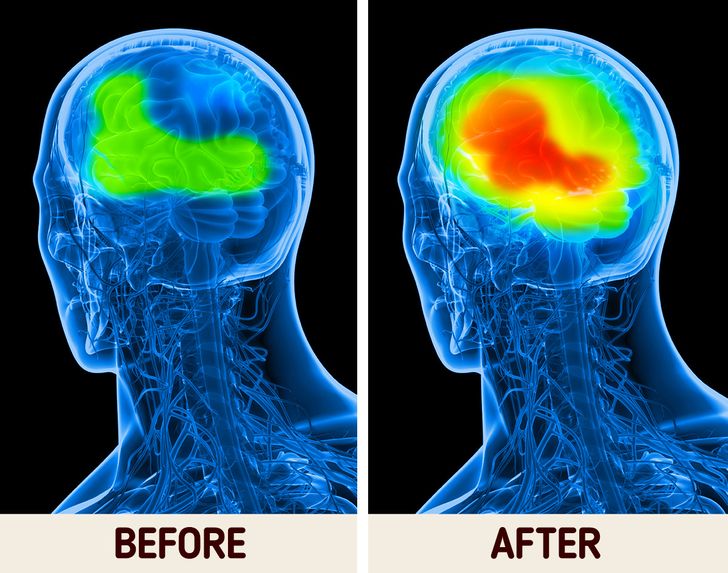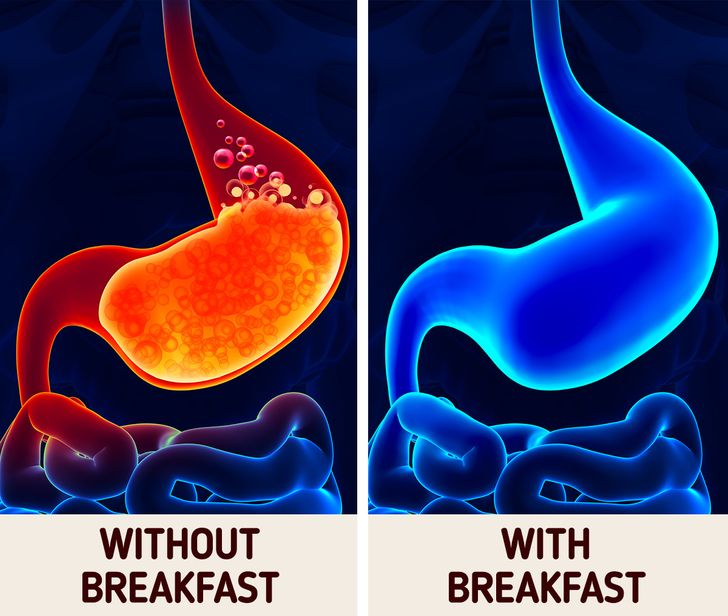well, I never miss my breakfast! saw it. I love food you know
What Happens to Your Body If You Skip Breakfast Every Day

We at Bright Side decided to study the different benefits and disadvantages of eating breakfast and would like to share what we learned with you.
1. You can gain weight.
Despite the idea that skipping breakfast every day can lead to weight loss, it’s not totally right. Some research has shown that staying hungry in the morning can be linked to obesity, not just in children and younger populations, but also among the elderly.
This may happen because skipping breakfast can make people binge later on. Eating before bed leads to weight gain. But one study also showed that skipping breakfast can cause weight gain even if you don’t overeat for the rest of the day because the body’s internal clock gets disrupted.
2. Your mood gets worse.
Skipping breakfast is associated with mood disorders among adults. People who don’t eat in the morning tend to have depression more often. Also, skipping the first meal of the day 4 or 5 times a week can lead to an increased risk of developing type 2 diabetes by 55%. It can also be connected to low blood sugar levels.
When one’s blood glucose level goes down, it results in rapid mood changes, like general moodiness and irritability. That’s why it shouldn’t be lower than 70 milligrams per deciliter (mg/dL).
3. You feel tired between 12 p.m and 4 p.m.
In the morning, after a long break without food, your glycogen stores are low and you need more energy to work productively. Once you have breakfast, your body starts to break down fatty acids to produce the energy it needs. If you don’t have breakfast, even if you feel good in the morning, you may feel very exhausted in a couple of hours. You also may struggle to focus on things and feel fatigued in the afternoon.
4. Your brain can get sharper.
Researchers have found that intermittent fasting has several beneficial effects. This type of eating means that you go through fasting periods each day (normally they consist of 8 hours of eating and 16 hours of fasting). So if you skip breakfast to complete these 16 hours, it may actually be good for your brain, and your memory can be improved.
However, if it’s not in the form of intermittent fasting, another study has revealed that skipping meals can have a negative effect on brain activity.
5. Your level of acidity increases.
Dietitians say that eating breakfast is even more important for people who deal with acid reflux. By skipping it, your acidity level may increase and you can suffer from heartburn and indigestion.
6. You may feel dizzy and suffer from headaches.
Improper dieting and meal-skipping can trigger headaches or migraines. Experts say that even delayed or irregular breakfasts can affect your body. This is usually due to people’s blood-glucose levels falling too low.
Headaches produced by a lack of food are often severe and can be accompanied by mild nausea. There are also some other symptoms that can include yawning, pallor, and sweating.
7. Your cortisol level can rise.
8. You put yourself at higher risk for heart disease.
People who regularly skip breakfast are about 21% more likely to suffer from heart disease. It’s also important to pay attention to what you eat in the morning. A single doughnut won’t be enough to give your body the necessary nutrition to help your body function well.
9. Your breath can get worse.
Those who skip breakfast are twice as likely to suffer from bad breath. Some people can be completely unaware of this problem. Leaving yourself without any food in the morning allows odor-causing bacteria to stay in the mouth.
10. Your menstrual cycle can be disrupted.
Research has shown that skipping breakfast can be linked to an irregular menstrual cycle. It also increases premenstrual pain and cramps. If you tend to have such things, it’s better to start eating good meals in the morning.
How often do you skip breakfast? What time do you normally have your first meal of the day?
Please note: This article was updated on January 14, 2022 to correct source material and factual inaccuracies"
Comments
it gives a pro and con of not having breakfast
WHAT 🤯
Well I mean I never skip breakfast but still...
Related Reads
Angelina Jolie Has Everyone Talking in Latest Appearance—Fans Are Saying the Same Thing

12 Insane True Stories That Could Make a Tarantino Script Look Tame

16 Moments That Remind Us to Stay Kind Even If the World Turns Ice Cold

20 Stories That Remind Us to Stay Kind Even When Life Stops Playing Fair

I Refuse to Forgive My Wife for What She Did to My Son

15+ Stories Proving That Hiring a Repairman Is Always a Total Lottery

18 Stories That Prove Kindness Can Come From the Most Unexpected Places

I Refuse to Help My Pregnant Sister, and I Don’t Feel Guilty

18 Seniors Whose Sharp Wit Proves Humor Only Gets Better With Age

19 Stories That Prove Money Is the Ultimate Truth Serum for Relationships

19 People Who Showed That True Kindness Doesn’t Need a Reason, Just an Open Heart

20 People Who Called Off the Wedding and Don’t Regret It for a Second










